 My guest this month is Isolde Martyn, an international award-winning author who is also a fellow Australian. Before taking up writing full-time, her career was in academia and then publishing. She is the co-founder of the Plantagenet History Society of Australia. Troubadour is her eighth historical novel. You can connect with Isolde via her website or Facebook.
My guest this month is Isolde Martyn, an international award-winning author who is also a fellow Australian. Before taking up writing full-time, her career was in academia and then publishing. She is the co-founder of the Plantagenet History Society of Australia. Troubadour is her eighth historical novel. You can connect with Isolde via her website or Facebook.
What or who inspired you to first write? Which authors have influenced you?
The mention of an anonymous woman spy known as ‘the Lady of Calais’! I was fourteen and decided that one day I’d write a novel about her, but to be really qualified, it meant getting a history degree at a uni specializing in the Yorkist era. Getting published took far longer but the lady’s story became my debut novel The Maiden and the Unicorn and to my delight and astonishment, the book won top awards in the USA and Australia.
Dorothy Dunnett was a great influence. Her humour, characters, research, everything! It was an honour to meet her when she came to Sydney because she was not only so gifted but also a lovely warm person, not at all stuffy, and the interview is on my website.
What is the inspiration for your current book? Is there a particular theme you wished to explore?
 With the current WIP, idea came from something that Australian actor/director John Bell mentioned in a talk arranged by the Richard III Society at the NSW State Library. There is no deliberate theme but I hope readers, especially in the UK, will find a resonance in our own time.
With the current WIP, idea came from something that Australian actor/director John Bell mentioned in a talk arranged by the Richard III Society at the NSW State Library. There is no deliberate theme but I hope readers, especially in the UK, will find a resonance in our own time.
What period of history particularly inspires or interests you? Why?
Five of my novels are set in the Wars of the Roses. It’s a time that hasn’t left a lot of archival material so there are plenty of gaps for historical novelists like me to interpret what may have motivated people. The Devil in Ermine is about Richard III’s coup from the viewpoint of his shady cousin, Buckingham. Mistress to the Crown is about Mistress Shore, King Edward IV’s lover, whose wiles must keep her from danger in the turbulent English Court.
I also wrote Fleur-de-Lis, a guillotine-free novel set in Paris during the French Revolution. Having turbulent events as a backdrop puts greater pressure on a book’s characters, and brings out qualities they did not realise they had. It gives an edge to everything. The subplot is about the rise of people-power and the press and why the revolution took a sinister turn. The main story is upbeat, though, and no one gets to ride in a tumbril.
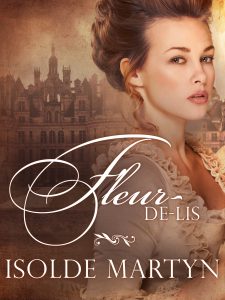
What resources do you use to research your book? How long did it take to finish the novel?
For my novels set in England, I mostly use collections in the UK National Archives and British History On-line, especially people’s wills – amazing how many of these have survived.
Visiting a place where a novel is set is always good, too, because that inspires and helps direct the plot. Very frustrating sometimes to be so far away in Australia. I can’t do a mad research dash over to France or Wales for the weekend.
How long does a book take? Well, if it’s fifteenth century, I’ve masses of Ricardian journals and it’s always been my area of study. For the Tudor era, I’ve needed to spend more time getting up to speed.
What do you do if stuck for a word or a phrase?
Roget’s Thesaurus can help and the Oxford English Dictionary is great for making sure the word’s not an anachronism. I try and collect slang and phrases from the literature of the time I’m writing about. Absolutely NO ‘twas’ and ‘twasn’t’ and ‘alack the day!’ stuff.
Is there anything unusual or even quirky that you would like to share about your writing?
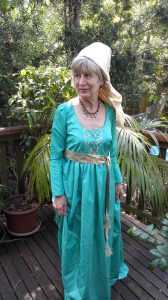 Not sure what you are after here, Elisabeth. I love using humour, especially in dialogue. Errour, the dog belonging to the hero in my first book would only ‘sit’ if the command was in Latin.
Not sure what you are after here, Elisabeth. I love using humour, especially in dialogue. Errour, the dog belonging to the hero in my first book would only ‘sit’ if the command was in Latin.
Do you use a program like Scrivener to create your novel? Do you ever write in long hand?
Tried using it when suspense write Jaye Ford and I were putting together a conference workshop but I was under pressure and couldn’t get it right.
Is there a particular photo or piece of art that strikes a chord with you? Why?
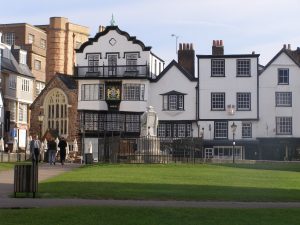 Yes, a drawing of a medieval banquet where one of the high class serving gentlemen has his long sleeves tied back. I used that in my first book. It’s fun looking for the little details that tell you about everyday life. A couple of years back, there was a splendid exhibition of Tudor clothing in portraits at the Buckingham Palace Gallery. The lace ruffs and fine embroidery were extraordinary. A fabulous pictorial reference. However, I could not find a picture of the banquet scene, instead I’ve chosen a photo of a corner of Exeter Cathedral Close. It reminds me of a very happy three years as an undergraduate, and last time I sat and had a coffee in one of those buildings, they’d just unearthed a Roman skeleton beneath the pavement outside. It’s a reminder how much there is still to discover and that history is full of surprises.
Yes, a drawing of a medieval banquet where one of the high class serving gentlemen has his long sleeves tied back. I used that in my first book. It’s fun looking for the little details that tell you about everyday life. A couple of years back, there was a splendid exhibition of Tudor clothing in portraits at the Buckingham Palace Gallery. The lace ruffs and fine embroidery were extraordinary. A fabulous pictorial reference. However, I could not find a picture of the banquet scene, instead I’ve chosen a photo of a corner of Exeter Cathedral Close. It reminds me of a very happy three years as an undergraduate, and last time I sat and had a coffee in one of those buildings, they’d just unearthed a Roman skeleton beneath the pavement outside. It’s a reminder how much there is still to discover and that history is full of surprises.
What advice would you give an aspiring author?
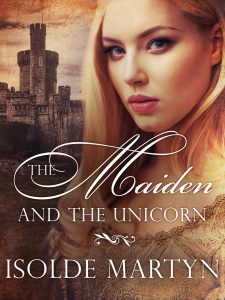 Read your story aloud to yourself to help eradicate the boring bits and be prepared to make cuts if fellow writers advise that you have too much backstory. It’s a good idea to learn how to style your mss and avoid default settings like line breaks between paragraphs and dialogue – create a novel not a report.
Read your story aloud to yourself to help eradicate the boring bits and be prepared to make cuts if fellow writers advise that you have too much backstory. It’s a good idea to learn how to style your mss and avoid default settings like line breaks between paragraphs and dialogue – create a novel not a report.
Tell us about your next book.
A real historical murder mystery. It was a real problem what kind of story to tell and from whose POV but I am three-quarters through — not sure how it will end!
Thanks for the interview, Elisabeth!
Featured Books:
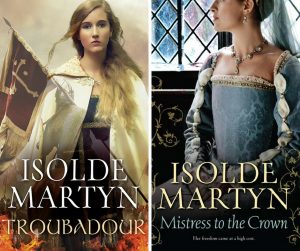
Troubadour
Can an unlikely alliance between a maidservant and a powerful lord save a city from destruction?
Troubadour, set in 1208-09, is about how a lord, a jester and a resourceful serving wench are determined to save their city-state in southern France from being destroyed by a crusading army. How civilised are we? It’s sad that even in our own times, cities and civilians are being destroyed with such savagery in the name of religion.
Set in the time of the Crusades, Isolde Martyn’s newest historical adventure has all the battle, action and romance of the Outlander series, plus the political intrigue and danger of a Philippa Gregory novel.
Mistress to the Crown, set in the turbulent times of the War of the Roses, tells the tale of Elizabeth Lambard, better known as the notorious whore, ‘Jane Shore’ – mistress to King Edward IV. Can Elizabeth’s wiles keep her out of trouble? Or will they lead her to the hangman’s noose?
All Isolde Martyn’s books can be purchased via her website.
Thanks for being interviewed, Isolde. So many wonderful books from which to choose!

Interested in learning the inspiration behind other novels? Subscribe to my Inspiration newsletter for monthly giveaways and history – both trivia and the serious stuff! You’ll also receive an 80 page free short story Dying for Rome -Lucretia’s Tale.



Love to hear how writers come up with their novels. An interesting interview.
Thank you for letting us see a bit into the mind of an author
Fascinating books and greatly interesting interview.
I love these historical novels. Time flies by when I am reading them.
Interesting interview…you have very interesting looking books, I enjoy books set during the War of the Roses.
I love historical books they are so interesting.
I have a huge obsession with history in general, and I am often researching and/or writing in it. The Wars of the Roses is an area of history I’ve long been fascinated by and I even gave a speech in my 10th grade speech class on it. Definitely going to have to check out the work of someone who loves it just as much!
I love anything that is historical… the interview was interesting to read and peaked my interest in the authors books. I am sure I am going to be reading more from the Wars of Roses time. Thanks for the interviews of other authors… I believe I am going to enjoy your monthly inspirations newsletters.
Great interview. I love to hear actual experiences of authors. These books sound very interesting, and I’ll have to read them now.
Interesting interview the books sound good.
Do historical novels have to be humour-free zones? Many I read are, yet true histories and oral histories have natural humour as part of the warp and weft of story and character. Does it put some readers and writers off a dramatic narrative to include humorous moments?
I agree, Ben. Humour is often missing. Isolde’s Troubadour is full of wry exchanges which makes it a delight to read.
Loved the bit about the dog only sitting when told to do so in Latin.
A great interview, and I love your new-look newsletter, Elisabeth.
Thanks for dropping by Lindy. Glad you liked the revamp ☺ and maybe I should have used Latin on my own dog who was far too excitable to listen to English commands!